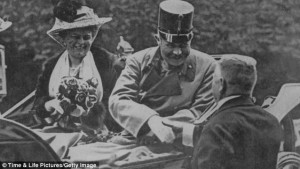Even Local Churches Can Crumble
 In the nineteenth century, Europe dominated the world by virtue of its economic and military strength. It could, with some legitimacy, boast that the European civilization was superior to all others. But then, something happened in Europe that changed everything.
In the nineteenth century, Europe dominated the world by virtue of its economic and military strength. It could, with some legitimacy, boast that the European civilization was superior to all others. But then, something happened in Europe that changed everything.
Earlier this year, June 28th, marked the 100th anniversary of the assassination of Archduke Ferdinand of Austria. At the time, it might have seemed a relatively minor event, as far as assassinations go.
However, the assassination of the archduke had unexpected consequences. This event precipitated World War I, which led to the deaths of nine million men.
When surviving troops finally returned home four years later, they unwittingly carried with them a virulent strain of influenza. In time, this killed another 50 million people.
In addition, the war led to a change of regime in Russia, from czarist autocracy to the secular communism of Lenin and Stalin. Their purges led to the loss of another 20 million lives.
At the war’s conclusion, China felt scorned by the European powers and formed its own communist party. Soon, the Cultural Revolution and ‘Great Leap Forward’ would cost the lives of another 40 million people.
Finally, the Treaty of Versailles, signed by Germany and the Allied powers on June 28, 1919 — exactly five years after the assassination of Archduke Ferdinand — though it was meant to end European hostilities forever, in fact set the stage for World War II. Another 60 million would die. 2.5% of the world’s population was lost.
Looking back and doing the math, the ‘minor’ assassination of an Austro-Hungarian duke led to more than 200 million deaths!
For the local church, there is a lesson to be learned here, as we look back and commemorate this event in history. Even little things can bring down great civilizations, at a tremendous cost to humanity. This is even truer of the greatest civilization of all—the local church, the church of Jesus Christ.
Even local churches can crumble.
It happened to the church of Ephesus, to which the greatest apostle of all time — a man by the name of Paul — wrote his theological masterpiece, the Epistle to the Ephesians. Paul was aware of what can happen to the local church. This was why, on his last visit to Ephesus, he called together the elders of the church and gave them a blueprint for survival:
Acts 20:25-38
And now, behold, I know that none of you among whom I have gone about proclaiming the kingdom will see my face again. Therefore I testify to you this day that I am innocent of the blood of all, for I did not shrink from declaring to you the whole counsel of God. Pay careful attention to yourselves and to all the flock, in which the Holy Spirit has made you overseers, to care for the church of God, which he obtained with his own blood. I know that after my departure fierce wolves will come in among you, not sparing the flock; and from among your own selves will arise men speaking twisted things, to draw away the disciples after them. Therefore be alert, remembering that for three years I did not cease night or day to admonish every one with tears. And now I commend you to God and to the word of his grace, which is able to build you up and to give you the inheritance among all those who are sanctified. I coveted no one’s silver or gold or apparel. You yourselves know that these hands ministered to my necessities and to those who were with me. In all things I have shown you that by working hard in this way we must help the weak and remember the words of the Lord Jesus, how he himself said, ‘It is more blessed to give than to receive.’” And when he had said these things, he knelt down and prayed with them all. And there was much weeping on the part of all; they embraced Paul and kissed him, being sorrowful most of all because of the word he had spoken, that they would not see his face again. And they accompanied him to the ship.
Watch for wolves. Admonish with tears. Help the weak.


Add your voice to the conversation: